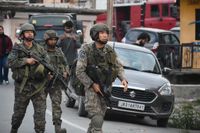Tensions between India and Pakistan escalated dramatically on May 7, 2025, as both nations exchanged military strikes in a conflict that threatens to spiral into a broader confrontation over the disputed region of Kashmir. The Indian army reported conducting operations targeting nine locations in Pakistan, labeled as 'terrorist infrastructure,' as part of a military initiative dubbed Operation Sindoor.
Pakistani officials, however, reported that their response involved attacks on six locations, resulting in at least eight civilian deaths and 35 injuries. The Pakistani government also claimed to have shot down five Indian aircraft in retaliation, although India has yet to confirm these assertions.
The strikes came in the wake of a terrorist attack on April 22, 2025, in Pahalgam, Kashmir, where armed assailants killed 26 people, predominantly Indian tourists. Following this, India accused Pakistan of harboring the attackers and vowed retaliation against those deemed responsible.
In a series of developments, the Indian Ministry of Defense stated, "These steps were taken in the aftermath of the barbaric terrorist attack in Pahalgam," emphasizing that India had shown significant restraint in selecting targets. The ministry claimed that the attacks were aimed solely at known terrorist camps and not at civilian targets.
As of May 7, 2025, the conflict has resulted in at least 36 fatalities and 94 injuries across both nations, with reports indicating that Indian airstrikes were precise and targeted. The Indian embassy in Washington asserted that the operations were "balanced, responsible, and non-escalatory," focusing exclusively on terrorist camps.
In response to the escalating violence, Pakistan declared a state of emergency in the Punjab province and closed its airspace, causing significant disruptions in air travel. Major airlines, including Qatar Airways, have suspended flights to Pakistan, and several airports in India have also been shut down.
The situation has drawn international concern, with leaders from China, Japan, and the United States urging both countries to exercise restraint. U.S. Secretary of State Marco Rubio expressed hope for de-escalation following discussions with Indian National Security Advisor Ajit Dowal.
The current military actions mark the largest Indian offensive into Pakistani territory since 2019, when India conducted airstrikes following a suicide bombing that killed over 40 Indian paramilitary personnel. Historically, the region has been a flashpoint for conflict, with both India and Pakistan claiming Kashmir in its entirety, leading to multiple wars since their independence in 1947.
The BBC highlighted the deliberate nature of the recent terrorist attack, which was not aimed at military personnel but rather targeted civilians, indicating a calculated effort to provoke a response. This incident has further strained relations, leading to a significant deterioration in diplomatic ties.
In the wake of the recent violence, both nations have taken steps to lower the rank of their diplomatic relations. India has ordered its citizens to return from Pakistan, closed border crossings, and announced a review of the water-sharing treaty governing the Indus River, which could have severe implications for the densely populated regions of Kashmir and Punjab.
As the situation develops, experts warn that the potential for further conflict remains high. Dr. Krzysztof Iwanek from the University of Bialystok noted that while Pakistan is likely to respond to India's military actions, it may not escalate to a full-scale war, as neither side desires such a confrontation.
Despite the ongoing tensions, Kashmir remains one of the most militarized regions globally, with a history of violence stemming from the anti-Indian insurgency that began in 1989. Rebel groups continue to challenge Indian control, seeking either integration with Pakistan or independence.
The international community continues to monitor the situation closely, with the United Nations emphasizing the need for both nations to avoid military confrontation. The spokesman for UN Secretary-General Antonio Guterres stated, "The world cannot afford a military confrontation between India and Pakistan," highlighting the potential global implications of the conflict.
As of now, the situation remains fluid, with both sides engaged in a tense standoff. The coming days will be critical in determining whether diplomacy can prevail over military action in this long-standing and volatile dispute.






